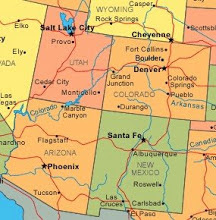By Steve Hammons
Some people suspect that at least one craft from "somewhere else" crashed near Roswell, New Mexico, in the summer of 1947.
People might also wonder if this incident was part of the beginnings of highly-classified U.S. government scientific research and defense-related activities.
Yet, other people doubt these ideas, or are very skeptical of these possibilities.
And still others may have inside information that there is some truth to the Roswell case and subsequent developments, but for one reason or another they help keep the sensitive situation in a semi-secret status.
Over the years, those who believe that information on UFOs should be more fully released to the public have been making their cases.
However, if information related to this topic is buried in deep "black" programs, or even within organizations that have been separated from the U.S. government, it might make an information-release process more difficult.
GRADUAL ACCLIMATION
In recent years, some other national governments have released "UFO files" to the public.
People who reviewed information in these releases could easily come to the conclusion that something interesting probably is at the core of many of incidents and circumstances noted in government reports on this subject.
Whether part of a planned effort or not, these releases seem to be serving as a gradual acclimation for the international public about the topics of UFOs and possible visitors to Earth from elsewhere.
In the U.S., information continues to surface indicating that similar acclimation and education efforts for the American public may have been going on for several decades. These activities may have included introducing ideas and concepts into movies, TV shows and other media.
Selective leaks may have helped in the gradual release of information about aspects of the UFO phenomena.
As a result, Americans and people around the world are probably more prepared to accept and adjust to further information on the subject.
READY OR NOT
Despite this preparedness, it remains unclear whether the Earth's populations are psychologically and emotionally ready to deal with more sophisticated information on the possible situation regarding UFOs and visitation of intelligent beings from elsewhere.
Attitudes about the topic appear to be complex, and do not seem to be based strictly on educational levels, socio-economic status, ethnicity, cultural contexts and other conventional demographic categories. Attitudes about UFOs and visitors seem to transcend many of these elements of human society.
Equally complex might be the actual overall situation of the history of U.S. and international government activities regarding UFOs. In addition, the deep and unconventional aspects of the situation could be surprising and even troubling.
That said, releasing information about possible realities involved in the UFO situation will probably continue as it reportedly has over the decades – gradual and safe acclimation in ways that benefit American citizens and people internationally.
If further efforts and activities are able to make progress in these areas, then they can be carefully evaluated and implemented.
The general public will probably continue to basically keep open minds and a healthy skepticism about such unconventional topics as our understanding of them becomes more complete.
skip to main |
skip to sidebar

In the past 30 days, readers from approximately 40 countries or territories using about 20 languages visited the Joint Recon Study Group site.

To see more articles, scroll down the right-side column.

Steve Hammons

Articles from the Joint Recon Study Group site and Transcendent TV & Media site are included.
The Joint Reconnaissance Study Group is the San Diego-based, combined-service/agency, research-and-activities team in my novels "Mission Into Light" and sequel "Light's Hand." This site contains information of interest to the JRSG.
Home page: Joint Recon Study Group site
Readers from around the world visit this site.

In the past 30 days, readers from approximately 40 countries or territories using about 20 languages visited the Joint Recon Study Group site.
April 2021 threat alert: ‘Force protection’ for our troops now the responsibility of all Americans
First responders must deal with society’s problems, shortcomings, injustices every day
Could some UFOs be linked to Native American 'white stone canoe' legends, stories?
Wildland firefighter basic training available at community colleges, tech schools, training centers
‘Boomer remover’ coronavirus is bigger threat to WWII generation that saved the world
‘Black swan’ events that aren’t: Coronavirus, climate emergency, unidentified aerial phenonema
Reagan’s complete 1987 UN message on ‘alien threat’ overlooked: Grave danger here, now
Was Reagan briefed about UFOs and original ‘Day the Earth Stood Still’ movie?
My military draft lottery number was #165 during final Vietnam War years
“Keep On The Sunny Side,” by The Whites, from movie O Brother, Where Art Thou?”
Living along Ohio River for centuries, Native Shawnee called it ‘Kiskepila Sepe’ – ‘Eagle River’
Native American words around us: States, towns, rivers, lakes, terrain, plants, animals, military
Athens County, Ohio, was key spot when colonists, Redcoats fought Shawnee in 1774 battle
1787 Northwest Ordinance set course for Ohio, Indiana, Illinois, Michigan, Wisconsin, Minnesota
Smallpox-tainted blankets were 1763 bioweapon on northern Appalachian Mountains frontier
Diana Krall performs “Maybe You’ll Be There" live in Paris with Paris Symphony Orchestra 2001.
Books to read in 2021? Novels "Mission Into Light" and the sequel "Light's Hand"
Novel excerpt: Renew, prepare America with ‘Urgent Response Group’ for teens, young adults
Diana Krall performs “I Get Along” live in Paris with Paris Symphony Orchestra 2001.
Steve Tyrell sings “Give Me the Simple Life.”
Diana Krall performs “Love Letters” live in Paris with Paris Symphony Orchestra 2001.
Visit the article archives!

To see more articles, scroll down the right-side column.
Novel "Mission Into Light" overview on Amazon
Novel "Light's Hand" overview on Amazon
Adventures of the Joint Recon Study Group: Overview and synopses of activities and operations
Key chapter overviews: Points of interest in the novel "Mission Into Light"
Key chapter overviews: Points of interest in the novel "Light's Hand"
Multimedia rights available
English and foreign-language book rights, audio book and e-book rights for "Mission Into Light" and "Light's Hand" are available. Movie and TV rights are available.
I'm seeking agent representation for these works and rights.
Please contact Steve Hammons for more information at hammons55@gmail.com.
Feature film screenplay
I completed a feature film screenplay in 2006 based on “Mission Into Light” and “Light’s Hand” combining key elements of both novels.
The screenplay takes audiences into the adventures and discoveries of the Joint Recon Study Group and the relationships among team members, friends and associates as they explore leading-edge research and emerging transcendent developments.
I'm seeking agent representation for this screenplay.
.........................
I also wrote a TV series pilot script based on "Mission Into Light" and "Light's Hand" story. I'm seeking agent representation this script.
About the Author

Steve Hammons
About the Author
I was born and raised in southwestern Ohio near the Kentucky and Indiana borders, then went to college at Ohio University in the southeastern Appalachian region of the state near West Virginia.
I graduated with a dual major in communication (journalism focus) and health education (psychology focus) with a minor in pre-law.
Ohio U. is home to the respected Scripps College of Communication and E.W. Scripps School of Journalism.
I also completed two graduate-level courses in guidance counseling theory and method at Ohio U.'s College of Education, School of Applied Behavioral Sciences and Educational Leadership.
At the end of my undergraduate education at Ohio University, I moved to the beautiful American Southwest where I applied my education, continual training and and ongoing experience to related professional fields such as health care, journalism and special research areas.
My novels "Mission Into Light" and the sequel "Light’s Hand" are available in e-book and 6"x9" paperback from most online booksellers worldwide.
Readers review metaphysical-military-intelligence adventure novel ‘Mission Into Light’
My articles on DoD CultureReady blog, Defense Language and National Security Education Office
Transcendent TV & Media site
Past articles: Scroll down the right-side column for more articles.

Articles from the Joint Recon Study Group site and Transcendent TV & Media site are included.
New films, TV series, books tell stories of ‘Ohiyo’ River Appalachian mountain region
Hillbillies, pioneers and UFOs: Current major media projects explore southern Ohio
Well-known ‘Mothman’ case also about dedicated local journalist, Native history?
Film experts, fans celebrate rediscovery of Appalachian story ‘Spring Night Summer Night’
'Hillbilly' J.D. Vance, columnist Clarence Page find common ground in southwest Ohio roots
‘Phoenix lights’ UFO linked to multiple incidents around four-state Colorado Plateau?
UFOs, odd phenomena reported on perimeter of Colorado Plateau
Theory about 37th parallel and UFOs sparked book, TV shows, film concept
Sketchy dimensions: UFO investigations reveal need for caution, potential for beneficial discovery
Can UFO-acquired technologies help the U.S. economy?
Many Americans have Cherokee in the family tree
Americans with Cherokee roots can't rely on government bureaucracies to define them
Government-approved Cherokees don’t tell whole story?
Does tribal government politician speak for all Americans with Cherokee ancestry?
‘Official Cherokees’ disrespecting mixed-ethnicity Americans?
Could ‘Hillbilly Elegy’ author J.D. Vance have Appalachian Cherokee ancestry?
Journalism’s dilemma: Covering weird science
Movie ‘Sedona’ explores metaphysical mysteries, Nature’s beauty, human heart
Novel excerpt: Insight, understanding not always found in official reports, documents
Novel excerpt: From Sedona to Heaven – What is the dimension we call ‘Heaven?’
Interest grows in healthy aging, anti-aging, reverse-aging, transcendent aging
Analysis: Research company involved with UFOs opens up about activities
Startup company researching advanced tech, UFOs gives updates during Q&A
Leverage US resources to understand unknown objects encountered by Navy, defense expert says
US Navy UFO encounters: Space scientists speculate on ‘first contact’ with visitors
UFOs in the heartland: New movie, ‘Blue Book’ TV series set in southwestern Ohio
Year of UFOs, 1952, may play role in Disney movie ‘Tomorrowland’
UFO situation awareness: Phoenix conference hosts scientists, researchers, media, public
Appropriate security on UFOs probably 2-way street
Roswell was ET crash, says ex-CIA officer – what’s been going on since 1947?
Alleged briefing to Pres. Reagan: Original ‘Day the Earth Stood Still’ was UFO acclimation?
Beyond UFOs and extraterrestrials: Human consciousness
Journalism in media mix: New shows ‘Chasing UFOs,’ ‘Spacing Out’ help prepare public
Further UFO disclosure requires readiness, teamwork, education, intelligence
Disclosure, acclimation, security work together on UFO, ET challenges
Up to speed on UFOs and intelligent visitors? Revised ‘A.D. After Disclosure’ book released in May
Authors Zabel, Dolan explore adjusting to UFO truths in new book ‘A.D. After Disclosure’
Blog Archive
-
▼
2009
(34)
-
▼
February
(8)
- Beyond soft power and smart power: Transcendent power
- Deploy soft power communication on human conscious...
- Arizona film, TV projects explore unusual topics, ...
- Should U.S. government release more data on UFOs?
- New intel group IARPA should explore soft power
- Funding for ‘soft power’ R&D needed now
- DARPA, In-Q-Tel can expand efforts for U.S.
- Algae-based jet fuel gets DARPA funding
-
▼
February
(8)































































































































































































